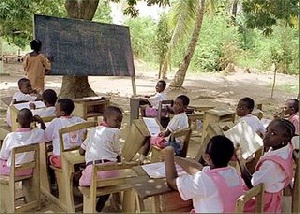 Schools in the country are bedeviled with infrastructural challenges
Schools in the country are bedeviled with infrastructural challenges
Education is a human right. Schools are the platforms for which this right is enhanced. A school is capable of facilitating this right when adequate infrastructure are available – libraries, classrooms, dining halls, laboratories and workshops, furniture and other teaching and learning materials.
On the contrary, across the length and breadth of this country schools right from the kindergarten to the senior high school level are bedeviled with infrastructural challenges – a challenge that keeps making it difficult for the academic success of those who happen to attend these schools.
Globally, access, equity and quality form the basis of every educational sector. These are defined largely by the adequacy or inadequacy of infrastructure as well as teachers. As much as governments over the years have been making some reforms in the educational sector, there’re still schools – both in rural and urban areas, where pupils and students learn under trees or in dilapidated classrooms and under other discouraging conditions.
These infrastructural challenges have dire consequences on the safety, contact hours and intellect of the pupils and students: school buildings collapse and fall on pupils resulting in deaths and injuries, abrupt end of class hours as a result of rains and truancy and consequently the annual abysmal performance of pupils and students at the Basic Education Certificate Examinations (BECE) and the West African Senior School Certificate Examinations (WASSCE).
Over the years there has been a lame excuse: the government can’t do it all – a reason that sounds good but not a good sound reason. It’s lame because all the resources that must be used to develop the educational sector is vested in the hands of the state and held in trust for the people by the government, so why can’t government do all?
It’s high time that those who are voted for to manage the affairs of this country rise above this excuse and address these challenges without making any excuses because it does not exonerate them. Education is crucial to the development of every nation – it exposes peoples to the challenges that confront them and provides them with skills to find sustainable solutions to these problems. Education is a right that must not be compromised.
In fact, Municipal and District Education Offices in the rural parts of the country are also facing the challenge of poor infrastructure. Isn’t it appalling that most Municipal and District Education Offices can’t boast of computers and stationery for their day to day administrative roles? How then can we overcome the albatross of falling educational standards?
As a nation, it then becomes a tall order for us to achieve Sustainable Development Goal (SDG) 4 “ensure inclusive and equitable, quality education and promote life-long learning opportunities for all” and its target 4 (a) “build and upgrade education facilities that are child, disability and gender sensitive and provide safe, non-violent, inclusive and effective learning environments for all”
Poor infrastructure defeats the principles of access, equity and quality. For instance, if a school lacks a science laboratory students can’t understand the practicals of chemistry, physics or biology. Access, equity and quality are meaningless if schools lack facilities that promote teaching and learning – at the end of the day, it’s as if we’ve made three steps forward and nine steps backward.
The problem of poor infrastructure runs through our educational sector right from early childhood to the senior high school level. News reportage on the educational sector especially from the rural areas reports the following: pupils sitting on the bare floor, pupils learning under a tree or in dilapidated classrooms, pupils learning without the requisite teaching and learning materials – a situation that makes access, equity and quality nothing but mere words.
The situation of infrastructural challenges in schools across the length and breadth of this nation is a constant denial of the educational rights of the Ghanaian child – a denial that has become an avenue for politicians to exploit in the form of donations of learning and teaching materials to these schools. What a pity that we do this to ourselves?
There’s the need to begin a revolution of ensuring that every child goes to school – a school that government has provided with enough tables and chairs, spacious and well ventilated classrooms, standard sanitation facilities, spacious and well-furnished laboratories, spacious libraries that have all the text books and supplementary reading materials, computer laboratories furnished with computers and their accessories, a safe environment, well-motivated teachers and a balanced meal – only then can we declare that we’re pursuing accessible, equitable and quality education.
It further portrays that we understand that education is a right.